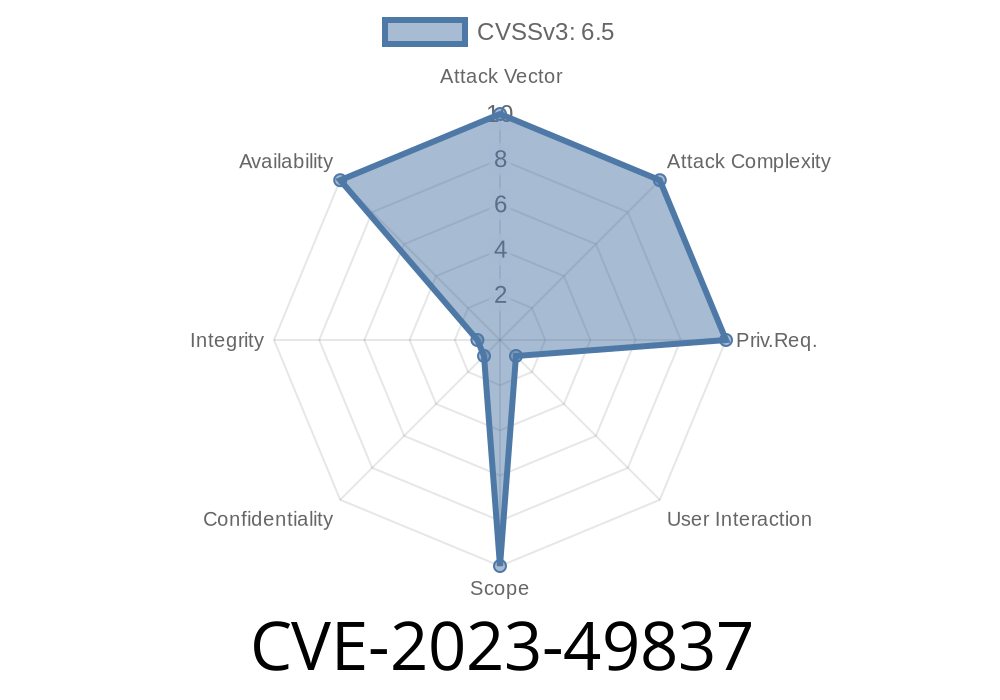Published: June 2024
Severity: High
Affected Software: Code Embed WordPress plugin, from versions "not available" (n/a) through 2.3.6.
TL;DR
A severe vulnerability was discovered in the popular Code Embed WordPress plugin by David Artiss. This bug (CVE-2023-49837) enables attackers to overload a website’s server by submitting crafted requests, leading to potential denial-of-service (DoS) and crashing the site. This article breaks down how the flaw works, provides example code, and offers resources for patching or mitigating the risk.
What is Uncontrolled Resource Consumption?
Uncontrolled resource consumption (also known as "resource exhaustion" or "DoS via resource abuse") means a software doesn’t limit how much CPU, memory, or disk it uses in certain parts of its code. An attacker can exploit this by sending special requests that make the site do more work than it should, eventually crashing it or slowing it down for everyone.
About Code Embed
Code Embed is a plugin that lets WordPress users easily embed code inside posts and pages. It’s got thousands of downloads and is often used by bloggers and web devs.
How Does CVE-2023-49837 Happen?
The vulnerability exists because Code Embed doesn’t place limits on how much code can be processed from a user-submitted shortcode.
Specifically, a user can craft a WordPress post or query that causes the plugin to process massive amounts of data, leading to high CPU or RAM use. The plugin fails to check for things like input size or number of iterations.
Suppose the plugin workflow looks something like
// Simplified Example: vulnerable shortcode handler
add_shortcode('code_embed', 'code_embed_handler');
function code_embed_handler($atts) {
$code = get_post_meta(get_the_ID(), $atts['id'], true);
// Directly outputs whatever is in the post meta, no length check
return $code;
}
If an attacker submits a *huge* blob of data in the code_embed shortcode’s id attribute (or submits a ton of shortcodes at once), the plugin will try processing and rendering all of them, potentially exhausting PHP’s memory and CPU.
1. Prepare a WordPress Post
An attacker creates a draft or submits content with many code_embed shortcodes or with massive data payloads.
[code_embed id="malicious_code_1"]
[code_embed id="malicious_code_2"]
[code_embed id="malicious_code_3"]
...
(repeat 100+ times)
Or with a massive single payload
// Insert in post meta for a post, possibly via API or in bulk
update_post_meta($post_id, 'malicious_code_id', str_repeat('A', 10*1024*1024)); // 10MB string
2. Request the Affected Page
Anyone visiting this post will trigger the plugin to try to render all the embedded code, straining the server.
Here’s what a malicious post might look like (simplified)
[code_embed id="deadbeefdeadbeefdeadbeefdeadbeefdeadbeefdeadbeef..."]
...
(repeated hundreds or thousands of times)
Or, in PHP
// This could be executed by an attacker with access to content editing or via a compromised plugin
update_post_meta(
123, // ID of the post
'CODE_EMBEDDED_MALICIOUS',
str_repeat('<?php while(1){} ?>', 100000)
);
Mitigation & Patch
The plugin developer, David Artiss, released a security update after version 2.3.6 to address this issue. Here’s what you should do:
The plugin should limit input length and the number of processed shortcodes, eg
if (strlen($code) > 10000) {
return 'Code block too large.';
}
// or limit to X shortcodes per page
More Reading & References
- NIST NVD entry for CVE-2023-49837
- Plugin’s WordPress Page
- David Artiss’s announcements
- Exploit-DB (search for "code embed" or "CVE-2023-49837")
Conclusion
CVE-2023-49837 makes it trivially easy to take down a WordPress site running vulnerable versions of Code Embed. All WordPress site owners using this plugin should upgrade ASAP. If you found this post useful or have more leads, comment below or share with your WordPress admin friends—let’s keep the open source web safe!
Stay secure!
*Written by AI, June 2024*
Timeline
Published on: 03/21/2024 17:15:07 UTC
Last modified on: 03/13/2025 19:15:40 UTC
